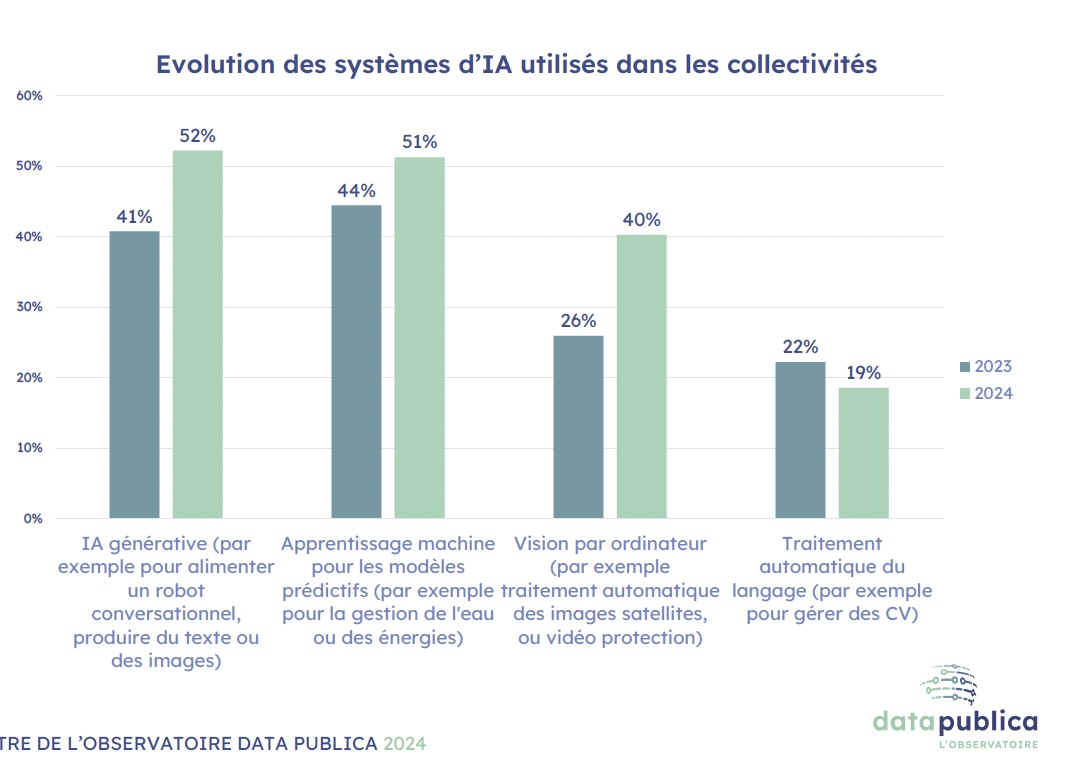Foreword
Some twenty artificial intelligence (AI) projects run by local authorities had been identified by 2022, and over fifty by 2023. By the end of 2024, they will probably number in the hundreds. 36% of local authorities surveyed say they have already implemented and tested an artificial intelligence system (AIS), and 15% plan to do so in the next twelve months (15%). This acceleration is largely due to the multiplication of projects based on generative AI, notably for the deployment of conversational robots designed for both agents and users.
Some local authorities are starting to involve citizens in the development of an AI doctrine or strategy.
Anxious to make AI a subject for public debate before any widespread deployment, the Interconnectés with France Urbaine and Intercommunalités de France launched a call on September 18 for the organization of territorial AI consultations.
On the occasion of the "Territorial frugal AI demonstrators" calls for projects, the Ministry of Ecological Transition, for its part, has undertaken to bring about the emergence of a Community of AI Actors in the territories.
The breakthrough of generative AI in local authorities
On November 12, 2024, the Data Publica observatory published its third barometer on the use of data by territories, with a particular focus this year on the use of AI.
The Barometer records a clear acceleration in the number of AI usage projects within French local authorities: more than one in two local authorities surveyed (51%) say they have either already implemented or tested an AIS (36%), or intend to do so in the next twelve months (15%). In 2022, the figure was 21%.
The highest percentages are found in the regions (75% have already launched projects for 2024) and metropolitan areas (62%). For the first time, a significant number of municipalities with populations of 3,500 to 10,000 are involved (14% have launched projects, compared with none in the 2023 survey).
Of the projects already underway in 2024, 29% concern administrative management and 11% customer relations. These projects alone account for 40% of the total, and could even represent 56% of new projects by 2025.
So there are probably several hundred projects underway. "These figures can be explained very directly by the multiplication of projects involving the use of generative AI. In particular, there are a great many chatbots or "conversational robots" being imagined or tested by local authorities of all sizes, both internally (to respond to agents who need information about their careers, for example) and externally (to provide information to users)."

In 2024, 52% of communities that used AI used generative AI.
"Easy to access, at least to carry out tests and take the first steps, generative AI is very logically the system that is making the most progress in 2024 in pioneering local authorities, with 52% in use. This is even truer for uses linked to administrative management: 74% of local authorities that use or intend to use AI for internal purposes say they will be using generative AI".
"Modeling tools, which make forecasts and can be used to steer certain urban functions, are probably the tools that best meet the needs of local public players. These AIS, which have existed for many years, could spread more rapidly in the years to come ".
Lack of skills, the main obstacle to AI implementation
The main obstacle to the use of AI in local authorities is the lack of skills, mentioned by 63% of local authorities and 67% of regions, but only 38% of metropolises.

The Barometer also highlights a lack of confidence in AIS (47%). Although this figure is lower among local authorities that have taken the first step, it remains high (38%). Even more sensitive is the issue of access to the necessary (and quality) data, which is only ranked 6th among obstacles by all local authorities, but rises to 3rd place (38% among those who have undertaken the first tests).
Référence :
A community of AI players in the Territories for the ecological transition
As part of its "AI and ecological transition" roadmap, the French Ministry of Ecological Transition has been supporting frugal AI-based solutions for territories since 2022.
The " Démonstrateurs d'AI frugale des territoires " (DIAT) call for projects targeted AI projects capable of making predictions and recommendations to aid decision-making. " AI solutions must be frugal in terms of data and energy, and their own environmental impact must be measured, which must be thought out upstream of project construction ".
12 projects were selected for this call for projects. The Banque des Territoires, operator of the call for projects, distinguishes three approaches to frugality among the selected projects:
- Minimize data collection, aiming for quality rather than quantity, and ensuring that only the data needed for the purpose is updated. This was notably the case with the IA.rbre project, which uses AI to help the Lyon metropolitan area detect "plantable" areas and use vegetation to create cooling zones or combat runoff phenomena.
- Limiting the number of sensors: frugality can also be achieved by exploiting data that are not originally environmental data. Through the Predict AI'r project run by the Paris-Ouest La Défense public institution, the consortium will be exploiting cell phone boundary data to deduce, using AI, users' travel patterns and their impact on air quality. A strategy that could make it possible to avoid multiplying the number of air sensors, while at the same time being applicable to any territory, in France or anywhere else in the world.
- Frugality can also be measured by the positive externalities that AI generates in organizations. In Saclay, for example, the Urba (IA) project supported by the agglomeration community promises to help local authorities in the Paris region revise their local urban planning schemes (PLU) by integrating all normative constraints in terms of environmental protection, whether regional or national.
These calls for projects have enabled the Ministry of Ecological Transition to bring together a Community of AI Actors in Territories (CAIAT) made up of representatives from territories, competitiveness clusters, research institutions, startups and companies.
Références :
Public consultations and citizen conventions on AI
Several local authorities have undertaken to involve citizens in the development of a doctrine or strategy around artificial intelligence.
In October 2024, the City of Paris sought the opinion of its residents on their perceptions of artificial intelligence and its application on Parisian territory. This digital consultation concluded with a day dedicated to AI on January 25, 2025.
Nantes Métropole had already adopted an AI doctrine, which stipulates that AI can only be used within a predefined framework, evolving through a "compass". While testing this doctrine throughout 2024, as part of internal experimentation with use cases applied to various professions and public policy needs, the metropolis organized a series of events around this "compass" throughout 2024. This "Nantes Débat de l'IA" process will culminate in the revision, during 2025, of the metropolitan charter, which will become the "Charte métropolitaine donnée et de l'IA".
Montpellier Méditerranée Métropole, for its part, organized a Citizens' Convention from November 2023 to February 2024 on " What artificial intelligence to serve residents and the territory? ". "This participatory process and the Opinion issued by the Citizens' Convention have "strengthened the legitimacy and effectiveness of this approach, drawing on the work and thoughts of the residents involved".
Références :
"Making AI a subject of public debate before any widespread deployment"
On September 18, Les Interconnectés, France Urbaine and Intercommunalités de France launched a call for the organization of territorial AI consultations.
"For elected representatives, agents, users, citizens, economic players and academics, keen to understand and control the potential uses of these AI systems and their impacts, these regional consultations will enable them to debate the conditions for their deployment and to raise expectations, points of vigilance and proposals on a regional scale".
In recent months, Montpellier Méditerranée Métropole, Rennes and Nantes Métropole have led the way in organizing consultations and debates with local staff and stakeholders on the issue of artificial intelligence (AI) and how local authorities should embrace it.
"What opportunities do these technologies open up? Under what conditions are these solutions deployed ? How can we guarantee ? What are the commitments in terms of energy sobriety? ? What guarantees can be given regarding the organization of people's work? ? What impact will this have on public services? Discussing these questions with users, employees, economic players and local civil society will be an opportunity to integrate the uniqueness of each territory and explore how social, environmental and ethical criteria - in a sense, responsible criteria - can be collectively defined and influence the strategic orientations of public players".
The results of these initiatives will feed into the production of a manifesto that will affirm the political doctrine of AI at the service of local authorities.
The first territories already committed to this approach: Nantes Métropole, Montpellier Méditerranée Métropole, Rennes Ville et Métropole, Toulouse Métropole, Métropole de Nice Côte d'Azur, Tours Métropole Val de Loire, Ville et métropole du Grand Nancy, Angers Loire Métropole, la Communauté de Communes de Lacq-Orthez, l'agglomération du SICOVAL, Bordeaux Métropole, Quimperlé Communauté, Paris Saclay, la Métropole Rouen Normandie, Communauté d'Agglomération de Béthune-Bruay Artois Lys Roman
Référence :
Intercommunalités de France: don't rush the widespread use of AGI in public services
"The risks and limitations associated with the use of AI, such as frequent errors and biases in the data that AI compiles, raise concerns about the reliability and fairness of automated decisions. In addition, the consequences for the professions of public agents and the need for adequate training will have to be taken into account."
Intercommunalités de France calls for the widespread use of AGI in public services not to be rushed:
- First, we need to learn from current experiments at both national and local levels;
- establish an ethical, legal and transparent framework for the use of AI, as well as guarantees to preserve the human link in public service.
Intercommunalités de France proposes :
- rigorous upstream evaluation of the tool using generative AI, the implementation of regulatory methods and the promotion of a local public debate on AI ;
- to develop "chosen" rather than "submissive" AI, elected representatives are calling for concerted action between the State and local authorities to define an appropriate framework for use;
- the question of education in digital culture and the use of these new digital tools is a cause for concern, and local staff will need to be trained to cope with this technological evolution.
Référence :
Sources
1. Data Publica 2024 Observatory Barometer: Local authorities and data
4. Paris: Share your opinion on artificial intelligence in the city
5. Artificial intelligence: Nantes Métropole adopts a framework of trust
7. Launch of territorial ia consultations in Nantes: towns and cities invited to participate
8. Digital technology and artificial intelligence: our positions







